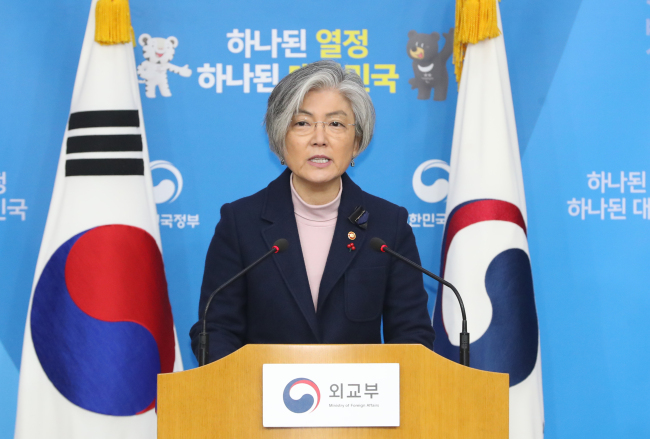The 2015 deal on Japan’s wartime sexual slavery of Korean women lacked a “victim-oriented approach” and Seoul will further communicate with the victims and civic groups before making a final decision, South Korean Foreign Minister Kang Kyung-wha said Tuesday.
 |
South Korean Foreign Minister Kang Kyung-wha answers reporters during a press briefing held at the Central Government Complex in Seoul on Tuesday. (Yonhap) |
“It is fundamentally a human rights issue,” Kang told a group of reporters. “There are victims whose human rights were directly affected and civic groups that have supported them for decades.
“Regarding the outcome of the task force‘s review, I think it is right for us to reflect the voices of the victims and the civic groups through sufficient communication before making the government’s stance (on the issue).”
Kang noted during a press meeting in Seoul that the previous government‘s move should have been based on wider and more solid opinions of the “comfort women” here. The term “comfort women” is a euphemism for women who were forced into military sexual servitude by Japan during World War II.
“The conclusion is that there was a significant lack of communication with the victims before the deal was made,” she said. “It is the result that we have expected but now we can say that with sufficient review and evidence.”
Kang’s remarks came a day ahead of the announcement of the outcome of a five-month review of the controversial deal signed between Seoul and Tokyo two years ago. The deal agreed to resolve the comfort women issue “finally and irreversibly” and for Tokyo to provide compensation of 1 billion yen ($8.9 million) to the victims.
But President Moon Jae-in, upon taking office in May, said South Korean citizens could not “emotionally accept” the deal and pledged to revisit it. Victims and civic groups also questioned the “sincerity” of the agreement, with some calling for a renegotiation.
Japan has been requesting the “faithful implementation” of the agreement. Addressing the sensitivity of the issue, the South Korean government said it would pursue a “two-track” approach in which such historical issues will be dealt with separately from diplomatic matters.
Kang remained tight-lipped about the details of the task force’s report, but said all options should remain open for Seoul. The government will make all possible diplomatic efforts to improve bilateral relations with Japan despite several difficult issues existing between them, she added.
The meeting came on the heels of Kang’s visit to Tokyo last week, where she met her Japanese counterpart Taro Kono and Prime Minister Shinzo Abe. Kono reportedly reiterated Tokyo’s stance on the deal, saying South Korea should stick to its agreement.
Seoul said it would deliver an advance briefing to Tokyo before the result of the task force investigation is released.
The South Korean government is likely to tread carefully on the issue with key events such as the 2018 PyeongChang Olympics fast-approaching, and may delay drawing up follow-up measures, according to Foreign Ministry sources.
Experts advised the current government to display political leadership in resolving the issue under the current circumstances.
“The comfort women issue, including the 2015 comfort women deal, is expected to be a key task for South Korea next year in maintaining and developing ties with Japan amid the rapid advances in North Korean nuclear and missile programs,” Lee Myon-woo, a senior research fellow at the Sejong Institute said in the think tank’s 2018 forecast.
“There is a high possibility that South Korea will ask Japan for a renegotiation ... and it is important for the South Korean government to show political leadership in the process.”
By Jung Min-kyung (
mkjung@heraldcorp.com)








